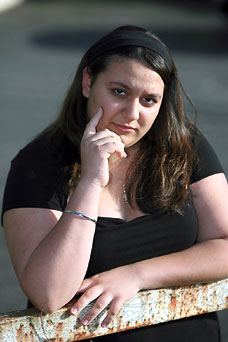Sarika Singh
Sarika Singh, whose full name is Sarika Watkins-Singh was pupil at the Aberdare Girls’ School in the Welsh town of Aberdare. On November 2007, she was excluded from her normal classes and was forced to attend lessons in isolation for two months after the staff at the school first noticed her wearing the kara or bangle, which is one of the five articles of faith worn by all practising Sikhs.
Sarika, who was born in 1994 is 14 years old and was the only Sikh in her school. She refused to remove the kara, saying it should not be treated as jewellery. The school’s uniform policy prohibits any jewellery other than a wristwatch and plain ear studs. Sarika, who is of Welsh-Indian origin said: “I am very disappointed that my school does not recognise my right to wear the kara. I did not like being put into isolation, which to me was like a prison. I feel my education was suffering.”
What began as a relatively small matter of school discipline is now escalating into a major international affair as Sikhs everywhere — plus human rights activists — fight to overturn the ban. Liberty, the human rights group which has filed the challenge, is expected to argue the school has breached race relations and human rights laws, as well as a 25-year-old Law Lords’ decision which allows Sikh children to wear items representing their faith — including turbans — to school. The group is asking for the school to amend its uniform policy to comply with Britain’s Race Relations Act.
Anna Fairclough, Liberty’s legal officer who is representing Sarika, said: “Sarika Singh has suffered humiliating isolation and is being denied a proper education simply because she wears the kara, a small bangle worn by virtually all Sikhs both in and out of school and work. It is astonishing that the school continues to exclude her despite almost universal condemnation and 25-year-old House of Lords precedent.”
Her mother, Sanita, disclosed she and her daughter had a meeting with the school’s board of governors, who ruled in favour of the ban. She said of the kara: “It’s not jewellery, it’s part of our faith and symbol of our belief. We feel very strongly that Sarika has a right to manifest her religion — she’s not asking for anything big and flashy, she’s not making a big fuss, she just wants a reminder of her religion. Sarika made her first visit to India in 2005, looking at her cultural background and her roots. I don’t believe in putting pressure on children to follow a certain religion, but Sarika decided for herself that she wanted to be a practising Sikh.”
Some Christians have written to Welsh newspapers defending the ban. They say that when Christian girls are forbidden from wearing the crucifix, there is no reason why Sikh girls should be allowed to wear a bangle.
Meanwhile, United Sikhs, an international advocacy charity, will also apply to file a third party intervention. The Support Sarika group on social networking site Facebook has 2,366 members, from countries as far afield as Canada, Australia, India and the U.S. “It really aggravates me that people aren’t even aware of the religions out there. I can’t even believe that they’re doing that to the girl,” wrote Gagan from Canada.
Hundreds of Canadian Sikhs are among nearly 4,000 people who have joined online petitions in support of a 14-year-old Sikh girl who has filed a legal challenge after being excluded by her school for wearing a kara.
See also
- The right to wear the 5Ks
- Mandla v Dowell Lee
- National Protest by UK Sikhs
- Turban, UK Legislation Regarding its use by Sikhs
- Articles of faith
- Turban
External links
- dailymail.co.uk
- news.bbc.co.uk
- unitedsikhs.org
- supportsarika.co.uk Support Sarika site - Sign the Petition - Watch the video.
- telegraph.co.uk
- icwales
- icwales
| These articles deal with Sikh's Five ks |
|
Kesh (uncut hair) -|- Kara (bangle) -|- Kanga (small comb) -|- Kachera (under garment) -|- Kirpan (sword) |

